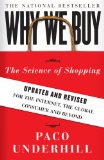My favorite writer on shopping is Paco Underhill. Underhill's books are classics in the science of shopping. (In fact, I am so interested in them that I made my wife read Why We Buy: The Science of Shopping to me while I drove us on a trip!) What I like about Underhill's books is they're data-driven: He heads a sales consulting company, Envirosell, that observes shopping habits and helps retailers improve their stores.
With Underhill's new book, What Women Want: The Global Marketplace Turns Female Friendly, coming out in July, I was inspired to write about some of the differences in how men and women shop that he discusses in his first book, Why We Buy: The Science of Shopping. I've taken all of the quotes below from that book. Keep in mind that these are generalities, so please don't be offended if they don't describe you! (But do let me know what you think by leaving a comment.)
By the way, this is the first in a series of posts on shopping. Why shopping? White Glove Apps is developing a mobile shopping application, and I wanted to share some of what I've learned from the experts about how we shop.
Shopping for high-tech gadgets

When it comes to technology, men shop and women buy. That is, men browse, looking for something cool even if they may not need anything at the moment. How many megapixels are digital cameras up to? How much does a high-end laptop computer cost? Familiarizing themselves with the answers to such questions lets men advise friends on purchases or quickly narrow down the options for a purchase of their own in the future. Men get these specs by reading written displays, either in-store or online. While women may discuss the cute skirt they just bought, men talk to friends about the cool features of their new videocamera or iPhone apps.
Women are on a mission in high-tech stores, looking for an item to meet their own immediate needs and those of their families. They care less about a computer's specs and more about what it can do for them. When selling to women, retailers would be wise to market high-tech products "like refrigerators instead of like scientific instruments." This is because women are generally less interested in what kind of wireless technology a digital camera uses; they care more about whether they can easily share photos with friends on facebook, for example. Women prefer to get product information by talking to salespeople.
Check out part 2 of this post to learn how men and women shop in other situations.



